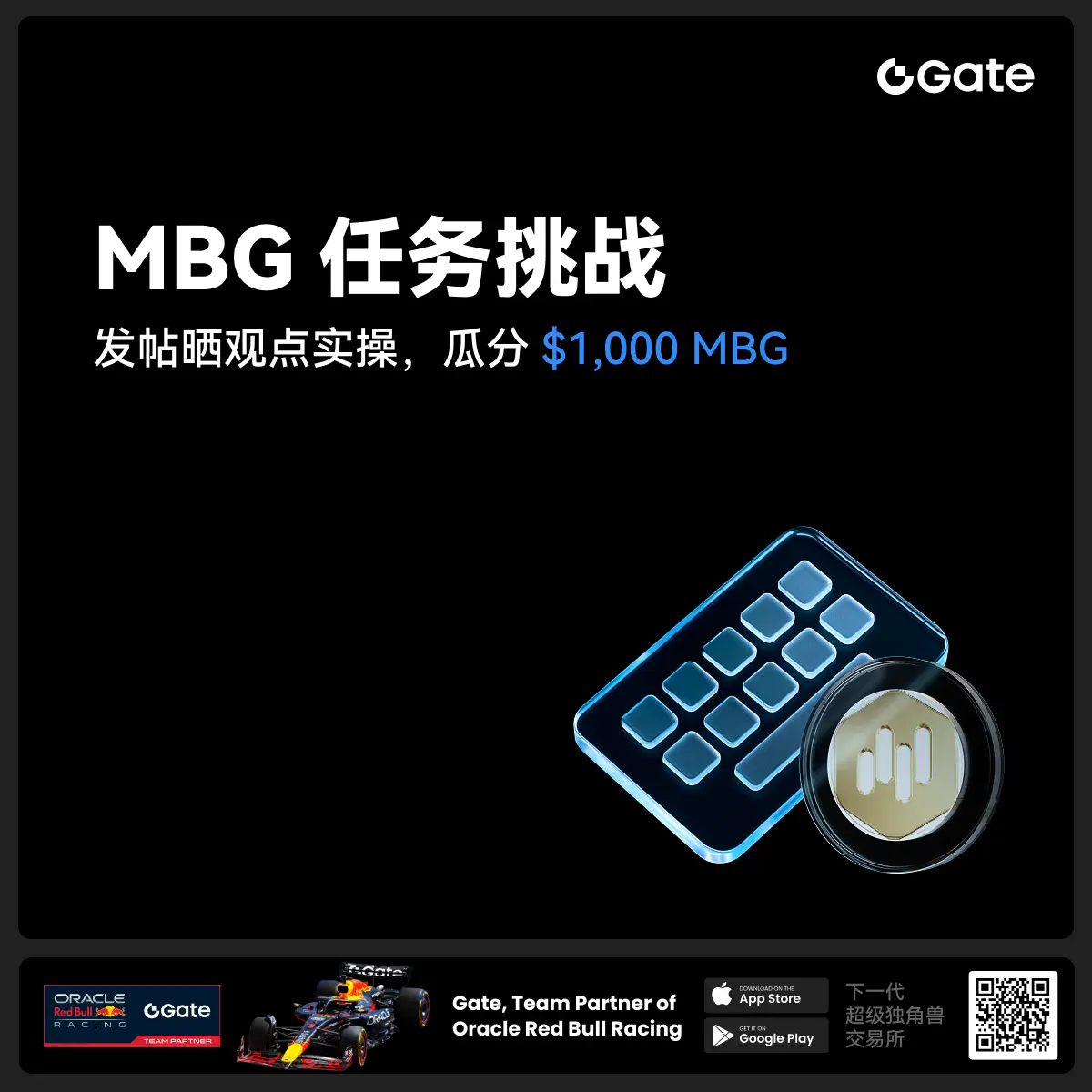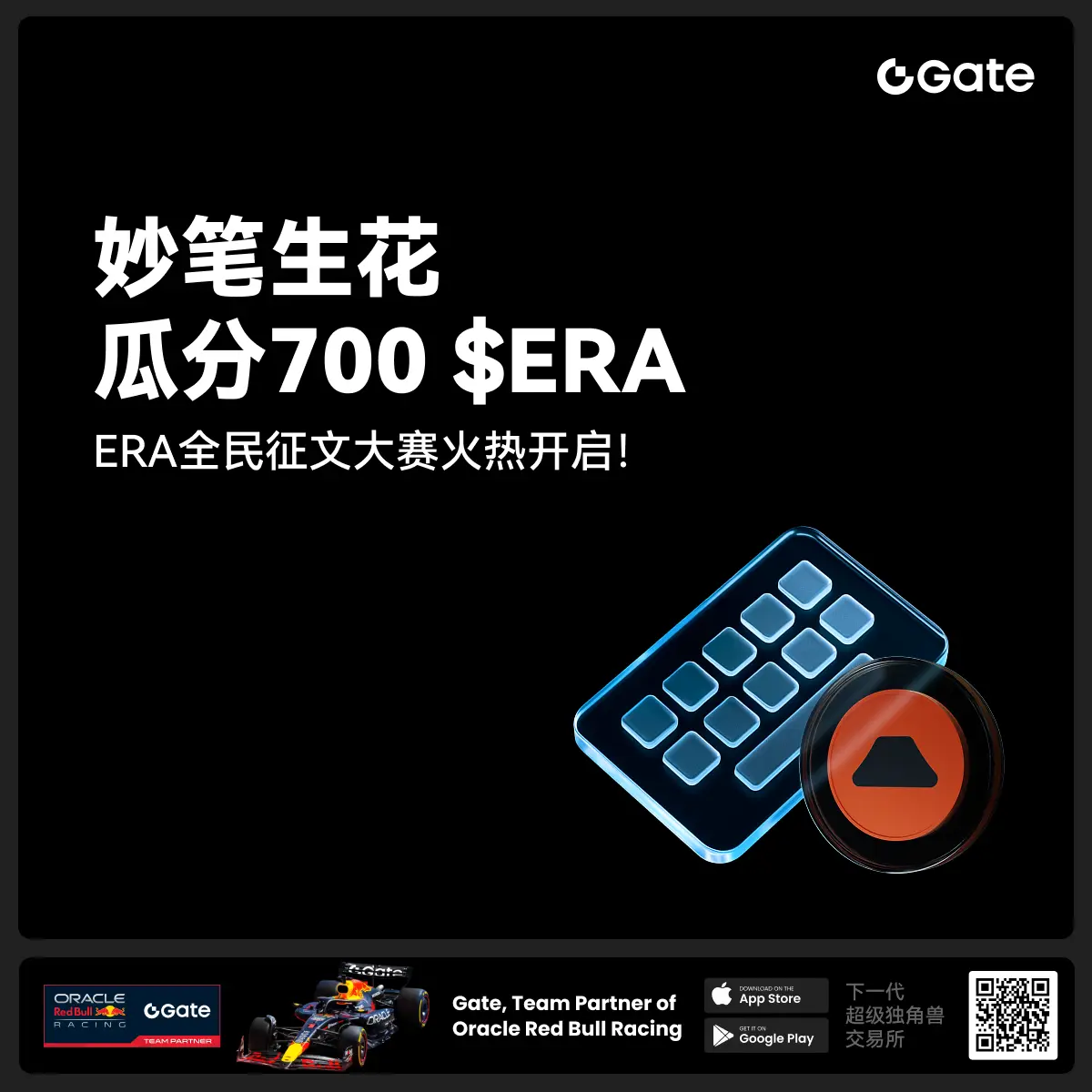- 话题1/3
13355 热度
11206 热度
4602 热度
7043 热度
46702 热度
- 置顶
- 📢 Gate广场 #MBG任务挑战# 发帖赢大奖活动火热开启!
想要瓜分1,000枚MBG?现在就来参与,展示你的洞察与实操,成为MBG推广达人!
💰️ 本期将评选出20位优质发帖用户,每人可轻松获得50枚MBG!
如何参与:
1️⃣ 调研MBG项目
对MBG的基本面、社区治理、发展目标、代币经济模型等方面进行研究,分享你对项目的深度研究。
2️⃣ 参与并分享真实体验
参与MBG相关活动(包括CandyDrop、Launchpool或现货交易),并晒出你的参与截图、收益图或实用教程。可以是收益展示、简明易懂的新手攻略、小窍门,也可以是现货行情点位分析,内容详实优先。
3️⃣ 鼓励带新互动
如果你的帖子吸引到他人参与活动,或者有好友评论“已参与/已交易”,将大幅提升你的获奖概率!
MBG热门活动(帖文需附下列活动链接):
Gate第287期Launchpool:MBG — 质押ETH、MBG即可免费瓜分112,500 MBG,每小时领取奖励!参与攻略见公告:https://www.gate.com/announcements/article/46230
Gate CandyDrop第55期:CandyDrop x MBG — 通过首次交易、交易MBG、邀请好友注册交易即可分187,500 MBG!参与攻略见公告:https://www.gate.com/announcements
- 🎉 Gate广场“星火计划”入驻KOL突破1000人!
💥 创作者生态迎来全面爆发期!
📈 上首页、拿奖励、赢影响力,你还在等什么?
💰 现金激励 ✔️
🚀 流量扶持 ✔️
👑 专属认证 ✔️
从0到1000,我们只用了短短数周,Gate广场正在成为Web3内容风暴眼⚡
你发布的不只是内容,而是下一个“爆款机会”!
🌟 加入星火计划,开启你的爆发之路!
👉 https://www.gate.com/announcements/article/45695
#GateSquare # #星火计划# #内容创作者新纪元 # #KOL集结令#
- 📢 #Gate广场征文活动第三期# 正式启动!
🎮 本期聚焦:Yooldo Games (ESPORTS)
✍️ 分享独特见解 + 参与互动推广,若同步参与 Gate 第 286 期 Launchpool、CandyDrop 或 Alpha 活动,即可获得任意奖励资格!
💡 内容创作 + 空投参与 = 双重加分,大奖候选人就是你!
💰总奖池:4,464 枚 $ESPORTS
🏆 一等奖(1名):964 枚
🥈 二等奖(5名):每人 400 枚
🥉 三等奖(10名):每人 150 枚
🚀 参与方式:
在 Gate广场发布不少于 300 字的原创文章
添加标签: #Gate广场征文活动第三期#
每篇文章需 ≥3 个互动(点赞 / 评论 / 转发)
发布参与 Launchpool / CandyDrop / Alpha 任一活动的截图,作为获奖资格凭证
同步转发至 X(推特)可增加获奖概率,标签:#GateSquare 👉 https://www.gate.com/questionnaire/6907
🎯 双倍奖励机会:参与第 286 期 Launchpool!
质押 BTC 或 ESPORTS,瓜分 803,571 枚 $ESPORTS,每小时发放
时间:7 月 21 日 20:00 – 7 月 25 日 20:00(UTC+8)
🧠 写作方向建议:
Yooldo
- 🎉Gate 2025 上半年社区盛典:内容达人评选投票火热进行中 🎉
🏆 谁将成为前十位 #Gate广场# 内容达人?
投票现已开启,选出你的心头好
🎁赢取 iPhone 16 Pro Max、限量周边等好礼!
📅投票截止:8 月 15 日 10:00(UTC+8)
立即投票: https://www.gate.com/activities/community-vote
活动详情: https://www.gate.com/announcements/article/45974
- 📢 #Gate广场征文活动第二期# 正式启动!
分享你对 $ERA 项目的独特观点,推广ERA上线活动, 700 $ERA 等你来赢!
💰 奖励:
一等奖(1名): 100枚 $ERA
二等奖(5名): 每人 60 枚 $ERA
三等奖(10名): 每人 30 枚 $ERA
👉 参与方式:
1.在 Gate广场发布你对 ERA 项目的独到见解贴文
2.在贴文中添加标签: #Gate广场征文活动第二期# ,贴文字数不低于300字
3.将你的文章或观点同步到X,加上标签:Gate Square 和 ERA
4.征文内容涵盖但不限于以下创作方向:
ERA 项目亮点:作为区块链基础设施公司,ERA 拥有哪些核心优势?
ERA 代币经济模型:如何保障代币的长期价值及生态可持续发展?
参与并推广 Gate x Caldera (ERA) 生态周活动。点击查看活动详情:https://www.gate.com/announcements/article/46169。
欢迎围绕上述主题,或从其他独特视角提出您的见解与建议。
⚠️ 活动要求:
原创内容,至少 300 字, 重复或抄袭内容将被淘汰。
不得使用 #Gate广场征文活动第二期# 和 #ERA# 以外的任何标签。
每篇文章必须获得 至少3个互动,否则无法获得奖励
鼓励图文并茂、深度分析,观点独到。
⏰ 活动时间:2025年7月20日 17
Solana验证者陷入收益与效率博弈困境:延迟区块成新策略?
By Jack Kubinec
Compiled by: TechFlow
As Solana’s code issues have been gradually resolved over the past few years, block times (the time it takes for the network to generate a new block of transactions) have dropped significantly, even below its nominal 400 milliseconds.
However, over the past month, an interesting trend has emerged: the median block time (a key performance indicator in the blockchain network, reflecting the speed at which the blockchain network processes transactions and generates blocks) has surged, and Solana has slowed down the rate at which it adds new transactions to the blockchain. The reason is a new validator strategy, which suggests that it may be more profitable to generate blocks slowly. According to Blockworks, Anza, Jito, and Marinade are considering solving this problem.
Each Solana block has a validator that takes on the role of leader — responsible for collecting transactions, creating blocks, and broadcasting them to the network. Leaders collect transaction fees for creating blocks. More order flow means more opportunities for fees, so a validator might choose to process a transaction in 500 milliseconds instead of 300 milliseconds to increase earnings.
At a basic level, some Solana validators appear to be waiting as long as possible to get more transactions into blocks and maximize their revenue. This behavior has led to an increase in Solana’s cycle length.
This is obviously not an ideal situation for a network that aims to be as fast as Nasdaq. In addition, fewer periods means less opportunity for compounding of staking rewards, a point made by Max Kaplan, CTO of Sol Strategies.
Solana provides a mechanism called grace ticks, which is a delay period that allows a leader to still successfully submit a block. This mechanism is designed to prevent validators in remote locations from being unfairly penalized, but it also opens the door for validators to intentionally delay submitting blocks.
Additionally, Solana’s alternative client, Frankendancer, recently released a revenue-maximizing scheduler.
According to Kaplan, validators running the client appear to be packing blocks at a slightly slower rate than normal. However, Kaplan added that Frankendancer’s delays are negligible compared to more severe delayers and he does not consider this a “bad thing.” In addition, block delays are not a new concept on proof-of-stake blockchains. However, the Firedancer upgrade may make this strategy more prominent on Solana. Jump has not yet commented on this.
Interestingly, Firedancer software engineer Michael McGee described this phenomenon on the Lightspeed podcast this week. He mentioned: “One thing we’re seeing with current validators is that…[validators] tend to create more profitable blocks by delaying transaction execution.”
Blockworks Research analyst Victor Pham noted that Solana validators with more noticeable block delays are often running modified versions of the Agave-Jito client.
For example, in mid-June, during epoch 802, Galaxy and Kiln both had median block times of over 570 milliseconds. Some unflagged validators also ran slower, while Temporal’s validators had a median block time of 475 milliseconds, according to Solana Compass data.
Kiln co-founder Ernest Oppetit acknowledged that its validator — the sixth-largest staked validator on the Solana network — had been delaying block slots for a period of time, but said that this behavior has now stopped.
“At Kiln, we pride ourselves on offering the highest APY on the market without sacrificing security. We are constantly doing R&D on different parts of our stack, including our timing strategy, and are in ongoing discussions with clients, client teams, and the foundation. Currently, we follow the spec and no longer delay blocks, but many other validators still do so. We believe that the incentive problem (fast block generation leads to reduced rewards) ultimately needs to be solved at the protocol level,” said Oppetit.
“I can say that we are not the reason people are aware of this,” said Ben Coverston, director of engineering at Temporal, when asked about his validators’ apparent participation in the slow block trend.
A Galaxy spokesperson said: “As a service provider, we support validator configurations that prioritize maximizing customer staking rewards. On Solana, this may mean proposing slightly slower blocks to ensure higher rewards. Galaxy has been responsive to community feedback and has adjusted block times to be within acceptable ranges.”
However, there is widespread consensus among the Solana validator community that slowing down the network is not appropriate, and slow validators are currently facing public backlash.
They may soon face more substantial penalties. According to Blockworks, Jito plans to blacklist slow validators from its staking pool, which is the largest on the Solana network.
Brian Smith, president of the Jito Foundation, said the organization is “drafting a governance proposal to give a committee the power to remove stragglers from the JitoSOL delegation set. This proposal should be open to the community for discussion within a few days.”
Marinade co-founder Michael Repetny said the staking pool provider is “considering bringing this up as a governance proposal to discuss the pros and cons of making [slow validators] a hard rule/delegation policy violation.”
Protocol-level solutions are also being worked on. Anza’s GitHub repository shows a new proposal that suggests cutting Solana’s grace tick period in half. In addition, Solana’s proposed consensus mechanism reform is also expected to solve this problem.
“Alpenglow will solve this problem by enabling the ability to skip voting,” said Brennan Watt, vice president of core engineering at Anza.
Watt revealed in a recent episode of the Lightspeed podcast that Anza hopes to have Alpenglow live on mainnet before the Solana Breakpoint conference in December this year.